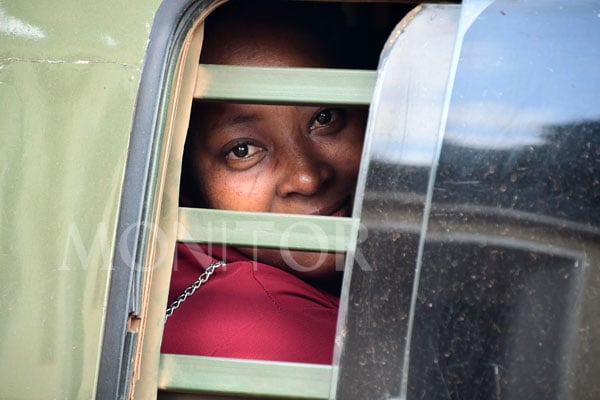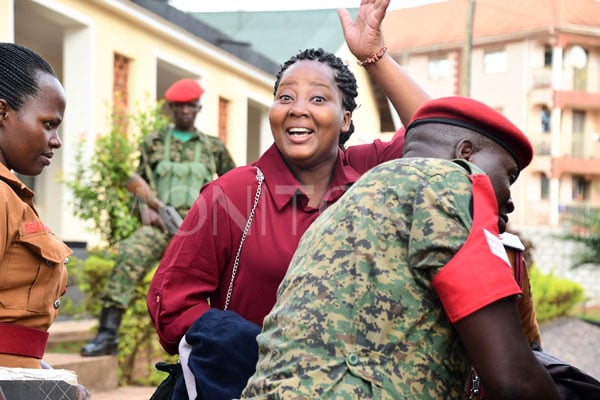Prime
Uganda's justice system under NRM on trial

Jailed NUP supporter Olivia Lutaaya peeps through a military truck window as it departs the army court in Kampala after she and 15 other opposition supporters pleaded guilty to unlawful possession of explosives at the General Court Martial in Kampala on October 14, 2024. Photo/ Abubaker Lubowa
What you need to know:
- The State used these admissions of guilt as the “evidence” it had failed to produce since mid-2021 to then hand out what on paper looks like legitimate sentences.
On October 18, a woman called Mercy Timbitwire Bashisha was stopped by a police constable called Charles Makawa at the traffic lights at the junction of Lugogo Bypass and Jinja Road in Kampala.Makawa accused Bashisha of driving recklessly, driving and speaking at the same time.Bashisha was asked to get out of her car, a white Toyota Land Cruiser.
A video clip showing Bashisha hitting Makawa and reportedly robbing his mobile phone and EPS gadget was recorded by an anonymous bystander. As usually happens these days, the video was published on social media and quickly began doing the rounds or, in Internet speak, “went viral”.Bashisha was arrested, taken to Nakawa Magistrate’s Court, charged with assault, and remanded to Luzira prison until November 4.The case became a public topic, including in Parliament where various MPs took turns to apologise to Makawa on behalf of the women of Uganda for Bashisha’s behaviour.
Makawa himself was lauded on social media, by police, and in Parliament for exercising admirable self-restraint in the face of Bashisha’s attack. So far, so good.A clear instance of today’s smartphones doing their magic and capturing such moments and, over the past decade, these ubiquitous smartphones have helped capture so many accidents, acts of racist police brutality in the United States, pickpockets, reckless drivers, and more.A Uganda police officer showed his professionalism by not retaliating when allegedly assaulted by Bashisha, and Uganda’s courts of law had done their work by charging her.It turns out that the story is not as clear-cut as it seems.
On Thursday, October 24, Daily Monitor columnist Nicholas Sengoba posted on his X/Twitter page a separate video of the same incident at Lugogo involving Bashisha and Makawa.This video, also captured by a smartphone, showed purported scenes moments before Bashisha started lashing out at Makawa. This second video shows the police officer allegedly beating Bashisha.From a forensic investigative angle, a question arises: Which of the two videos was shot first, the one showing Bashisha assaulting the policeman or the new one showing the policeman assaulting Bashisha?
I have brought all this up to show the complexity of today’s world. Things are not quite what they seem.The ever-present smartphone that now does so much to spontaneously capture moments and incidents practically everywhere can capture one moment but, not having captured the preceding few moments, can lead the public to form an incomplete and inaccurate view of what really happened.
Before I saw the video shared by Sengoba, I had posted on Twitter this suggestion:“One law the table-banging Uganda Law Society president [Isaac Ssemakadde] should help repeal is that forbidding the media from discussing matters before courts. Our legal system has been so corrupted that justice might be better served by opening court proceedings to the court of public opinion.”My proposal to Ssemakadde’s Uganda Law Society to seek a repeal of the law on sub judice came from the depressing news about 16 supporters of the Opposition National Unity Platform (NUP).
Olivia Lutaaya and 27 other NUP supporters appeared before the General Court Martial in Makindye on September 9 for the 56th time to answer to charges whose trial has never started kicked off since they were arrested in 2021.They had maintained their innocence all along since 2021.In a statement on September 10, NUP President Robert Kyagulanyi said: “We are informed that regime emissaries have been secretly reaching out to these comrades and their relatives, threatening them with even harsher punishment if they do not plead guilty to the charges fabricated against them.
The emissaries also kept harassing them to drop the party lawyers who have been representing them in exchange for military lawyers.”On October 8, Kampala Deputy Lord Mayor Doreen Nyanjura visited Lutaaya and said in a Twitter post on October 14 that “she [Lutaaya] told me she had decided to plead guilty in order to regain her freedom, she broke down and cried but added, [Honourable], I have been here for four years!”
The minister of Youth, Balaam Barugahara, visited the Kitalya prison on October 13 and reportedly asked the NUP supporters to plead guilty so they could be granted their freedom.Lutaaya and 15 other NUP supporters on October 14 pleaded guilty to charges at the court martial. A NUP lawyer, Marvin Saasi, and the NUP secretary general David Rubongoya visited the court martial on October 14.Saasi wrote on Twitter: “[We] went to the court martial today...and found Olivia Lutaaya [and] other political prisoners. He [Barugahara] asked Olivia whether she'd pleaded guilty.
‘Yes,’ she answered. He repeated his question twice. She maintained her answer.”What, then, happened at Kitalya prison on October 13?The sequence of events and the general background clearly indicate that Balaam Barugahara went on his own initiative to negotiate a plea bargain with the NUP supporters, or was sent by the government.In a particularly cruel and cynical twist, rather than keep their part of the plea bargain, the State used these admissions of guilt – obtained not necessarily by physical torture but by taking advantage of the traumatised NUP members – as the “evidence” the State had failed to produce since mid-2021 to then hand out what on paper looks like legitimate sentences.On October 23 the General Court Martial handed the 16 NUP supporters a sentence of three months and 22 days in prison for attempting to overthrow the government and possessing bombs and other explosive devices.
It’s not clear if Barugahara initiated the plea bargain as a personal act out of sympathy in his role as minister of Youth or he was asked by the NRM state to lead the move and then the State went behind his back and used the confessions to sentence the NUP supporters.This, then, is the legal environment in which we live and it explains why the most unlikely maverick, Ssemakadde, was elected president of the Uganda Law Society by a 69.5 percent landslide.This is not just the usual political bickering and agitation. Uganda is living under an autocratic regime that is quickly turning into a fascist regime.
The arbitrariness with which public officials are sacked by the appointing authority, the egregious injustice thousands of Ugandans are facing as they are evicted from their land, and the sheer, broad-daylight impunity we experience daily in public life cannot but signal a state approaching a breaking point.To be fair, in Mercy Bashisha’s case, the state acted in good faith and with a sense of fairness.However, as I explained at the start, the second video changes the whole narrative and shows why the government should fine-tune its investigative machinery.
Finally, the way I have put these two cases together, the Bashisha and the NUP supporters, is sufficient proof of why the judicial system can no longer be the single arbiter of justice.As we start looking forward to the significant 2026 General Election, this should weigh on the mind of every lawyer, state prosecutor, journalist, political party activist, human rights defender, and Western diplomat. Previous post-election petitions by the Opposition have been dismissed with the argument that the evidence produced was “not enough” to overturn the election outcome.
Given that the prying eyes of smartphones are everywhere these days and from time to time capture vital evidence, such as in Bashisha’s case, shouldn’t we random citizens, journalists, and idle bystanders be allowed a greater say in matters of court?What would the Nakawa Magistrate’s Court think after reading this new evidence I have produced on the Bashisha case, thanks to my chancing on a post by columnist Sengoba, as well as piecing together valuable bits of testimony on Twitter by Bobi Wine, Marvin Saasi, and Doreen Nyanjura?We have seen much of the arrest and re-arrest of former Forum for Democratic Change (FDC) president Kizza Besigye at the High Court in November 2005 and the new norm of re-arresting suspects after the High Court has just granted them bail.
From this, the fact is that the greatest challenge Uganda’s courts face today is not sub judice by the news media but the all-out impunity, pressure on judges, and the military invasion of court premises by the NRM state.
The reason I'm keen on the law, the courts, and the recent Uganda Law Society election is that the NRM state has been using the law and courts to give its autocratic tendencies the appearance of respectability and adherence to the legal process.




